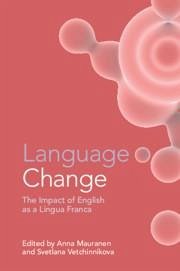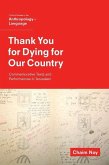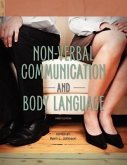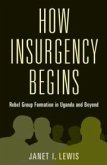Language Change
Herausgeber: Mauranen, Anna; Vetchinnikova, Svetlana
Language Change
Herausgeber: Mauranen, Anna; Vetchinnikova, Svetlana
- Broschiertes Buch
- Merkliste
- Auf die Merkliste
- Bewerten Bewerten
- Teilen
- Produkt teilen
- Produkterinnerung
- Produkterinnerung
Bringing together multiple strands of linguistics, this book explores the impact of English as a lingua franca on language change.
Andere Kunden interessierten sich auch für
![Communication in Everyday Life Communication in Everyday Life]() Sherry Devereaux FergusonCommunication in Everyday Life121,99 €
Sherry Devereaux FergusonCommunication in Everyday Life121,99 €![Exploring Professional Communication Exploring Professional Communication]() Stephanie SchnurrExploring Professional Communication65,99 €
Stephanie SchnurrExploring Professional Communication65,99 €![Thank You for Dying for Our Country Thank You for Dying for Our Country]() Chaim NoyThank You for Dying for Our Country54,99 €
Chaim NoyThank You for Dying for Our Country54,99 €![Non-Verbal Communication and Body Language Non-Verbal Communication and Body Language]() Non-Verbal Communication and Body Language316,99 €
Non-Verbal Communication and Body Language316,99 €![How Insurgency Begins How Insurgency Begins]() Janet I LewisHow Insurgency Begins45,99 €
Janet I LewisHow Insurgency Begins45,99 €![Inside Countries Inside Countries]() Inside Countries44,99 €
Inside Countries44,99 €![Film at the Intersection of High and Mass Culture Film at the Intersection of High and Mass Culture]() Paul CoatesFilm at the Intersection of High and Mass Culture38,99 €
Paul CoatesFilm at the Intersection of High and Mass Culture38,99 €-
-
-
Bringing together multiple strands of linguistics, this book explores the impact of English as a lingua franca on language change.
Hinweis: Dieser Artikel kann nur an eine deutsche Lieferadresse ausgeliefert werden.
Hinweis: Dieser Artikel kann nur an eine deutsche Lieferadresse ausgeliefert werden.
Produktdetails
- Produktdetails
- Verlag: Cambridge University Press
- Seitenzahl: 350
- Erscheinungstermin: 3. Dezember 2020
- Englisch
- Abmessung: 226mm x 153mm x 25mm
- Gewicht: 523g
- ISBN-13: 9781108729819
- ISBN-10: 1108729819
- Artikelnr.: 59644117
- Herstellerkennzeichnung
- Libri GmbH
- Europaallee 1
- 36244 Bad Hersfeld
- gpsr@libri.de
- Verlag: Cambridge University Press
- Seitenzahl: 350
- Erscheinungstermin: 3. Dezember 2020
- Englisch
- Abmessung: 226mm x 153mm x 25mm
- Gewicht: 523g
- ISBN-13: 9781108729819
- ISBN-10: 1108729819
- Artikelnr.: 59644117
- Herstellerkennzeichnung
- Libri GmbH
- Europaallee 1
- 36244 Bad Hersfeld
- gpsr@libri.de
Introduction. Dynamics of change from different perspectives and on
different scales Anna Mauranen and Svetlana Vetchinnikova; Part I. Pooling
Perspectives: Introduction Anna Mauranen; 1. Calling Englishes as complex
dynamic systems: diffusion and restructuring Edgar W. Schneider; 2. English
as a lingua franca in the context of a sociolinguistic typology of contact
languages William Croft; 3. How writing changes language Ewa D¿browska; 4.
ELF and translation as language contact Anna Mauranen; 5. Present-day
standard English: whose language was it anyway? Terttu Nevalainen; 6. ELF
and the study of sociolinguistic change Janus Mortensen; Part II. Zooming
in on ELF: Introduction Svetlana Vetchinnikova; 7. ELF, language change and
social networks: evidence from real-time social media data Mikko Laitinen
and Jonas Lundberg; 8. ELF and language change at the individual level
Svetlana Vetchinnikova and Turo Hiltunen; 9. Are multilinguals the better
academic ELF users? Evidence from a questionnaire study measuring
self-assessed proficiencies Peter Siemund and Jessica Terese Mueller; 10.
The role of co-textual and contextual cues for intelligibility in ELF
interactions Veronika Thir; 11. Exploring the pragmatics of
computer-mediated English as a lingua franca communication: multimodal and
multilingual practices Rino Bosso; 12. Development of shared multilingual
resources in ELF dyadic interaction: a longitudinal case study Aki Siegel;
13. The role of translanguaging in ELF advice sessions for asylum seekers
Alessia Cogo.
different scales Anna Mauranen and Svetlana Vetchinnikova; Part I. Pooling
Perspectives: Introduction Anna Mauranen; 1. Calling Englishes as complex
dynamic systems: diffusion and restructuring Edgar W. Schneider; 2. English
as a lingua franca in the context of a sociolinguistic typology of contact
languages William Croft; 3. How writing changes language Ewa D¿browska; 4.
ELF and translation as language contact Anna Mauranen; 5. Present-day
standard English: whose language was it anyway? Terttu Nevalainen; 6. ELF
and the study of sociolinguistic change Janus Mortensen; Part II. Zooming
in on ELF: Introduction Svetlana Vetchinnikova; 7. ELF, language change and
social networks: evidence from real-time social media data Mikko Laitinen
and Jonas Lundberg; 8. ELF and language change at the individual level
Svetlana Vetchinnikova and Turo Hiltunen; 9. Are multilinguals the better
academic ELF users? Evidence from a questionnaire study measuring
self-assessed proficiencies Peter Siemund and Jessica Terese Mueller; 10.
The role of co-textual and contextual cues for intelligibility in ELF
interactions Veronika Thir; 11. Exploring the pragmatics of
computer-mediated English as a lingua franca communication: multimodal and
multilingual practices Rino Bosso; 12. Development of shared multilingual
resources in ELF dyadic interaction: a longitudinal case study Aki Siegel;
13. The role of translanguaging in ELF advice sessions for asylum seekers
Alessia Cogo.
Introduction. Dynamics of change from different perspectives and on
different scales Anna Mauranen and Svetlana Vetchinnikova; Part I. Pooling
Perspectives: Introduction Anna Mauranen; 1. Calling Englishes as complex
dynamic systems: diffusion and restructuring Edgar W. Schneider; 2. English
as a lingua franca in the context of a sociolinguistic typology of contact
languages William Croft; 3. How writing changes language Ewa D¿browska; 4.
ELF and translation as language contact Anna Mauranen; 5. Present-day
standard English: whose language was it anyway? Terttu Nevalainen; 6. ELF
and the study of sociolinguistic change Janus Mortensen; Part II. Zooming
in on ELF: Introduction Svetlana Vetchinnikova; 7. ELF, language change and
social networks: evidence from real-time social media data Mikko Laitinen
and Jonas Lundberg; 8. ELF and language change at the individual level
Svetlana Vetchinnikova and Turo Hiltunen; 9. Are multilinguals the better
academic ELF users? Evidence from a questionnaire study measuring
self-assessed proficiencies Peter Siemund and Jessica Terese Mueller; 10.
The role of co-textual and contextual cues for intelligibility in ELF
interactions Veronika Thir; 11. Exploring the pragmatics of
computer-mediated English as a lingua franca communication: multimodal and
multilingual practices Rino Bosso; 12. Development of shared multilingual
resources in ELF dyadic interaction: a longitudinal case study Aki Siegel;
13. The role of translanguaging in ELF advice sessions for asylum seekers
Alessia Cogo.
different scales Anna Mauranen and Svetlana Vetchinnikova; Part I. Pooling
Perspectives: Introduction Anna Mauranen; 1. Calling Englishes as complex
dynamic systems: diffusion and restructuring Edgar W. Schneider; 2. English
as a lingua franca in the context of a sociolinguistic typology of contact
languages William Croft; 3. How writing changes language Ewa D¿browska; 4.
ELF and translation as language contact Anna Mauranen; 5. Present-day
standard English: whose language was it anyway? Terttu Nevalainen; 6. ELF
and the study of sociolinguistic change Janus Mortensen; Part II. Zooming
in on ELF: Introduction Svetlana Vetchinnikova; 7. ELF, language change and
social networks: evidence from real-time social media data Mikko Laitinen
and Jonas Lundberg; 8. ELF and language change at the individual level
Svetlana Vetchinnikova and Turo Hiltunen; 9. Are multilinguals the better
academic ELF users? Evidence from a questionnaire study measuring
self-assessed proficiencies Peter Siemund and Jessica Terese Mueller; 10.
The role of co-textual and contextual cues for intelligibility in ELF
interactions Veronika Thir; 11. Exploring the pragmatics of
computer-mediated English as a lingua franca communication: multimodal and
multilingual practices Rino Bosso; 12. Development of shared multilingual
resources in ELF dyadic interaction: a longitudinal case study Aki Siegel;
13. The role of translanguaging in ELF advice sessions for asylum seekers
Alessia Cogo.








